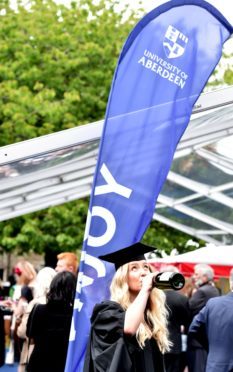Concerns have been raised about university marking systems after it emerged students are now far more likely to score top passes than they were less than a decade ago.
Data from the Higher Education Statistics Agency shows that the number of people scoring first grade passes at campuses across the north-east has soared over the past decade.
At Aberdeen University, the percentage scoring a first has more than doubled from 11.1% in 2010 to 23.5% last year.
That number rose from 10.8% to 17.10% at Robert Gordon University, and similar upswings were detailed in other parts of Scotland.
Aberdeen University said last night that such increases have been caused by establishments offering “enhanced” teaching and operating stricter entry requirements.
The think tank, Reform, believes that universities risk undermining the importance of receiving a first by awarding too many.
And it claimed universities have altered the way grades are calculated to increase the number of students receiving top marks, as they compete to attract applicants.
It added there was “considerable evidence” that universities’ degree algorithms, which translate marks into a final classification, are contributing to grade inflation.
Tom Richmond, who authored a report for Reform, argued that falling standards in the UK could cause students to seek education abroad.
He said: “Rocketing degree grade inflation is in no one’s interest. “Universities may think easier degrees are a way to attract students, but eventually they will lose currency and students will go elsewhere, even overseas.
“Restoring the currency of degrees would also mean better value for money for the £18billion that universities receive each year in tuition fees.”
Nick Hillman, director of the Higher Education Policy Institute, believes universities are “essentially massaging the figures”.
He said: “They are changing the algorithms and putting borderline candidates north of the border.”
Out of the 1,720 students to finish undergraduate degrees at Aberdeen University in 2017, 405 people were awarded firsts, 770 got a 2:1 and 185 a 2:2.
In 2010, it handed out 205 firsts and 780 2:1s, from a total 1,850 graduates.
A spokesman for the university added: “We have a rigorous and robust system of assessment that includes external input and that ensures our students are marked fairly, and on the basis of academic merit.
“In recent years, the university has enhanced its approach to teaching while raising entry requirements for prospective students, which has resulted in an increase in the number of graduates gaining higher degree classification.”
Figures from 2010 were not available for the University of the Highlands and Islands, but 12% of its students scored a first last year.
